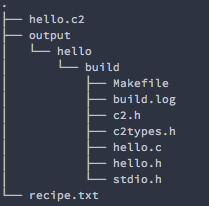Please see C2Lang.org for more info about C2!
The C2 project attempts to create a new language, strongly based on C. In a nutshell, the main differences with C are:
- no more header files (too much typing)
- no includes
- packages (needed if we can't have includes)
- compiled per target (not per file)
- more logical keywords (public/local replaces static)
- integrated build system
Below are the instructions for building and using the C2Compiler.
Have fun! (and code..)
C2 is based on LLVM 7.0 and some parts of Clang 7.0. The design of C2C's Parser and ASTBuilder classes are heavily based on clang's Parser and Sema class, so hereby my thanks to the Clang folks!
A short list of open items (the full list would probably fill-up GitHub) with their priority:
- [high] c2c: parse full syntax into AST (ALMOST DONE)
- [high] c2c: generate IR code for more AST elements
- [medium] tool: create graphical refactor tool (c2reto) (IN PROGRESS)
- [medium] c2c: tab completion on targets in recipe / cmdline args
- [medium] tool: create c-parser for parsing C headers.
- [medium] tool: create c2format - astyle for C2.
- [low] tool: c2grep - grep only files in recipe
Read the installation document for installation on Linux or OSX. For Windows installation, see windows installation document.
By default, c2c will only parse and analyse the targets. Generating C-code should work on all examples, but generating LLVM's IR code is work in progress. In the examples directory: (or add -d examples/)
c2c multi
c2c hello
c2c puzzle
c2c -I working_ir
It's also possible to manually compile a single .c2 file without a recipe file with:
c2c -f <file.c2>
To generate ANSI-C code, use:
c2c -C <target>
The C2 compiler is able to generate a package dependency file in dot format. This file can be converted into a png as follows:
c2c --deps <target>
dot -T png output/target/deps.dot > image.png
To see all available options, run:
c2c -h
c2tags is C2's version of ctags. This tool is used by vim (e.a.) to "jump to definition". See the installation document on how to install.
How it works is as follows:
- use --refs or add $refs in recipe.txt to generate refs file during compilation.
- c2c generates a refs file per target. This file contains all references and their respective destinations.
- c2tags currently doesn't have a full-blown vim-plugin yet, but a small code-fragment in your .vimrc should suffice.
- Pressing ctrl-h (configurable) with your cursor on any symbol will jump to its definition. Pressing ctrl-o (default) will jump back.
Just like c2c itself, c2tags can be called from any (sub)directory in the project tree.

